

Vocal Motion
Calling parents in Marin County, CA, tune your children’s voices in private or group lessons at Vocal Motion, a teaching facility that offers an integrative method for singing and speech. Owned by Monica Norcia, a voice teacher, singing performer, pianist, and music director since 1997, Vocal Motion specializes in building the voice and speech of kids and adults alike by placing special attention to diction and understanding of text and musical melody into lessons. Monica has successfully helped many students find their voice and get accepted in auditions, musicals, and plays, as evidenced by the heaps of praise and thanks she receives in her Testimonials page. Get in touch with her through Vocal Motion and learn how she can teach you how to take your performance to the next level.
Vocal Motion - Hope you had a great summer. What's up this... Sound Advice #47 – Many Roads Intersect With Good Singing. Recently, I went for an astrological reading because I’m in my “second Saturn return” (Please Google it if you are not an astrology buff).
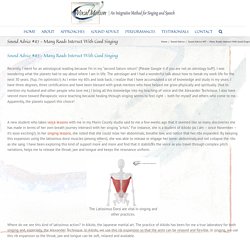
I was wondering what the planets had to say about where I am in life. The astrologer and I had a wonderful talk about how to tweak my work life for the next 30 years. Sound Advice #46 – The Voice: A Mirror to our Inner World. Sound Advice #45 – The Tongue is a Many-Splendored Thing. Sound Advice #44 – What Exactly is Vocal Technique?
Sound Advice #43 – Out with the Old, In with the New. But First…Pause. Sound Advice #42 – When It Comes to the Breath, Start with Beginner’s Mind. Does Knowing the Anatomy of Singing Matter? Sound Advice #40 – To Learn or Not to Learn New Songs. Sound Advice #38 – Is There an Optimal Physical “Form” for Singing? Sound Advice #37 – Singing While Playing An Instrument.
Sound Advice #36 – Recognizing and Accepting Your True Gift.
Sound Advice #34 – Going with the Flow. Sound Advice #33 – Detecting Energy Leaks that Affect the Voice. One of the first things I do when a prospective student comes to my Marin studio for voice lessons is to get a general impression of his or her body organization and energy.

Some folks are physically and energetically collapsed. Others might be hyper-tense. It’s not just physical, it may be a quality of their personality. Once my sister asked me what I meant by a person’s “energy” body and I said: “Have you ever met someone new and immediately liked them or disliked them?” She said yes. Most voice teachers are very good at reading this energy because it is generally clearly reflected in the voice. The Alexander Technique is historically wonderful for helping singers find physical as well as emotional balance. I have noticed through the years, however, that standing balanced on two legs with our arms hanging at our sides is very uncomfortable for many people.
Sound Advice #32 – In the Beginning, There Is A Lot Going On. “I’m always terrible starting a song,” an adult student who takes singing lessons with me in Marin said to me recently.
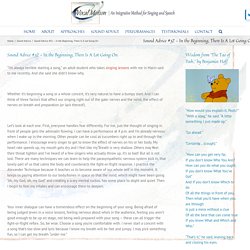
And she said she didn’t know why. Whether it’s beginning a song or a whole concert, it’s very natural to have a bumpy start. And I can think of three factors that affect our singing right out of the gate: nerves and the mind, the effect of nerves on breath and preparation (or lack thereof). Let’s look at each one. First, everyone handles fear differently. Your inner dialogue can have a tremendous effect on the beginning of your song. I remember one of my first teachers would say that when you hear the introduction to a song, that’s when all the preparation starts. In addition, one of the keys to a successful start is not just how to breathe but when. Another factor that interferes with a good start is listening too much.
And to reframe our anxieties, what feels like fear may also be excitement. Sound Advice #30 – Singing Lessons Open Your Eyes and Ears to Excellence. The past week, two singers who take voice lessons with me in my Marin studio expressed amazement after listening to other singers.
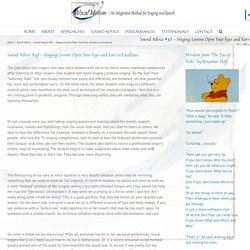
One student had heard Angela Lansbury singing “By the Sea” from “Sweeney Todd.” She specifically noticed how easily and efficiently she breathed, yet how powerful her voice and performance were. On the other hand, the other student, who sings in a different musical genre, was mortified at the poor vocal technique of her musical colleagues. Sound Advice #29 – Spiritual Wisdom for the Fearful Singer. Recently I picked up a book by the Indian philosopher and sage Jiddu Krishnamurti called “Life Ahead,” reflections on the mature life.

He spoke about fear in a way that so deeply affected me, I wrote two pages of his wisdom in my journal. As someone who gives singing lessons for kids and adults, I was struck by how his words could speak to performers with stage anxiety. Here is what he wrote: “Contentment comes from understanding what you actually are and do not pursue what you should be.” He later says: “Through the process of envy (which pushes us to want more, to be more) you hope to arrive at contentment…Contentment is a state of creativeness in which there is the understanding of what actually is. If you begin to understand what you actually are from moment to moment, from day to day, you will find that out of this understanding there comes an extraordinary feeling of vastness, of limitless comprehension.
So, I have embarked on looking at my motivations and relationship with. Sound Advice #28 – The Joy Of Singing With Others. My husband and I just returned from a trip to Europe, where we visited my Italian cousins in Rome and explored parts of Greece, a country high on my “bucket list.”
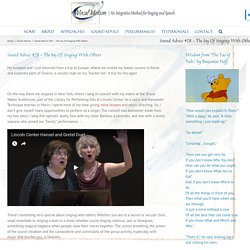
A trip for the ages! On the way there we stopped in New York, where I sang in concert with my sisters at the Bruno Walter Auditorium, part of the Library for Performing Arts at Lincoln Center. As a voice and Alexander Technique teacher in Marin, I spend most of my time giving voice lessons and music directing. So, I don’t give myself many opportunities to perform as a singer. The concert was awesome! Sound Advice #27 – Feelings, Nothing More Than Lovely Feelings… Occasionally, in the middle of adult voice lessons, my student will be singing and then burst into tears.
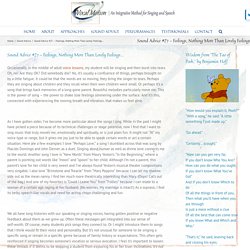
Oh, no! Are they OK? Did somebody die? No, it’s usually a confluence of things, perhaps brought on by a little fatigue. It could be that the words are so moving, they bring the singer to tears. As I have gotten older, I’ve become more particular about the songs I sing. Sound Advice #26 – Those Whose Work Inspires Us. I graduated from the Alexander Technique teacher training in 2002 and I immediately started sharing the technique with my singing and voice students in my Marin studio.
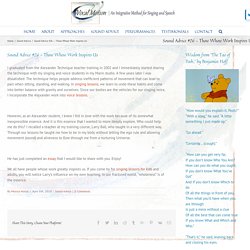
A few years later I was dissatisfied. The technique helps people address inefficient patterns of movement that can lead to pain when sitting, standing, and walking. In singing lessons, we learn to undo these habits and come into better balance with gravity and ourselves. Since our bodies are the vehicles for our singing voice, I incorporate the Alexander work into voice lessons. Sound Advice #25 – The Spine and Vocal Support. When you take voice lessons with me in my Marin studio, you will be introduced to the Alexander Technique.
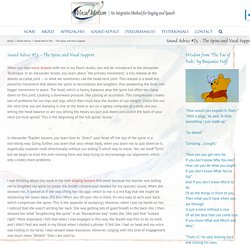
In an Alexander lesson, you learn about “the primary movement,” a tiny release at the atlanto occipital joint – or what we sometimes call the head-neck joint. This release is a small but powerful movement that allows the spine to decompress and lengthen, thus awakening the body into bigger movement in space. The head, which is heavy, balances atop the spine but often we clamp down on this joint, creating a downward pressure, like closing an accordion. This compression creates lots of problems for our hips and legs, which then must bear the burden of our weight.
Check this out the next time you are standing in line at the bank or are on a laptop computer at a desk. In Alexander Teacher lessons, you learn how to “direct” your head off the top of the spine in a non-doing way. Sound Advice #24- Voice Lesson Protocol. As a teacher of voice lessons in Marin County and a singing student myself, I have learned through the years what is expected of me (and what I expect of my students) when taking voice lessons.
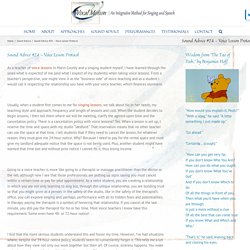
From a teacher’s perspective, one might view it as the “business side” of voice teaching and as a student I would call it respecting the relationship you have with your voice teacher, which finances represent. Usually, when a student first comes to me for singing lessons, we talk about his or her needs, my teaching style and approach, frequency and length of lessons and cost. When the student decides to begin lessons, I then tell them where we will be meeting, clarify the agreed-upon time and the cancellation policy. There is a cancellation policy with voice lessons? Yes. I find that the more serious students understand this and honor my time. Sound Advice #23 – Finding Your Breath. They call it the “breath of life”! And most of us, unless you suffer from asthma or emphysema, take it for granted. We inhale, we exhale, we inhale, we speak. We inhale, we sing. But not all students who come to my voice lessons and singing lessons in Marin are experienced with using the breath for singing.
Some, like children, even need to be told we sing on the exhale. Many years ago, when I went to my first Alexander Technique lesson, I didn’t really know what my instructor had done. Sound Advice #22 – Singing in the Second Half of Life. I have quite a few students who come to my Marin studio for singing lessons who are over the age of 65. And, I think the phrase I hear most from them is something to the effect of “I never had to think of this voice when I was younger” or “Singing used to be so much easier!”
Yes, it probably was. Age does create some big physiological changes for singers. And, if knowledge of vocal technique didn’t quite matter when one was young, it sure matters now to keep the voice as aerodynamically balanced and efficient as possible in the face of those changes. This blog is not intended to be an in-depth look at voice and the aging process such as a speech pathologist might share. For instance, seniors may experience an overall decrease in muscle mass, tissue atrophy or edema, which can interfere with the delicate interaction of the larynx and vocal folds.
Sound Advice #21 – The Struggle For Vocal Consistency. The past week, two of my students who take voice lessons in my Marin voice studio expressed their yearning for more consistency in their singing. I know this desire well: the ability to have your voice “work” every time you open your mouth, day or night, whatever the range or style. A lovely goal! And completely achievable. However, there is one element to consider and it’s a big one: We are organic beings, ever changing physically, emotionally and mentally in these bodies that are our instrument.
Imagine if you sat at the piano to play and suddenly the piano started moving around in three dimensions. Sound Advice #20 – Fear in Life, Fear while Performing. Sometimes adults come to my voice lessons with stage fright issues and I share what I have found effective to keep nerves at bay. However, I now understand that stage fright goes deeper than just performance. Anxiety can permeate many aspects of one’s life. It may be such an engrained aspect of our way of being that we can’t imagine what life would be like without it. I shake. There. I remember in high school, as a cellist, performing the first movement of the “Boccherini Cello Concerto in B-flat.” Recently I stumbled upon a book by Lissa Rankin, M.D., called “The Fear Cure.” So, since reading the book, I have started a practice. Sound Advice #18 – Cultivating Young Singers of Questionable Talent. During a voice lesson with one of my adult students, who is also a dad, I asked whether his daughter is also a singer.
She isn’t, he said, and he thought that perhaps it had something to do with the fact that when she was younger, he would tell her not to “howl” when she would sing. A not surprising outcome, I thought. Every year, when New Year’s resolutions come around, I often get calls for voice lessons in my Marin studio from adults who want to try singing. Often, it has been a lifelong dream. Sound Advice #19 – Speaking of Which, Speech Lessons are Fascinating! When I suffered vocal nodules in college, based on stupidly tackling difficult opera on a tense body, I took speech therapy to heal the damage. I remember doing a lot of breath work on the floor and staying silent for two weeks, so the nodules could go away and the cords return to their natural length. Sound Advice #17 – Casting Children’s Theater. In addition to giving singing lessons for kids and adults in Marin, I also love children’s theater. I’ve been involved in the Ross Valley Schools’ YES program as a music director for more than 10 years, shifting from one school to another with a variety of talented directors and choreographers that make up the “creative teams.”
I also music direct at many private schools in the area. It’s always very exciting for children to be part of these productions, some starting as early as 3rd grade and acting in them until they go off to high school. Sound Advice #16 – Why a Voice Journal? The Concept of “Inhibition” in the Alexander Technique. In my voice lessons for kids and adults, I like to introduce, early on, one of the Alexander Technique’s greatest gifts – the concept of Inhibition. No, it’s not psychology’s use of the word, as in “he was very inhibited.”
It has to do with how we react or respond to the world. First, we must understand that, as singers, our bodies are our instrument and an ever- moving one at that. You wake up in the morning and perhaps you’re a little tired and physically collapsed. Or you inhabit the Amazon body, physically armored and shielded against the slings and arrows of outrageous fortune. Sound Advice #14 – The Voice Student Living with Parkinson’s Disease - Vocal Motion Method. Sound Advice #13 – Integrating the Speaking and Singing Voice – A Personal Journey - Vocal Motion Method. Sound Advice #12- Singing and Vulnerability - Vocal Motion Method. Sound Advice #11: The Importance of Energy in Singing - Vocal Motion Method. Merriam Webster’s Dictionary defines the word energy as “a dynamic quality,” “a usually positive spiritual force,” “a vigorous exertion of power” or, more scientifically, “a fundamental entity of nature that is transferred between parts of a system in the production of physical change within the system and usually regarded as the capacity for doing work.”
Whew! Sound Advice #10- What Are We Warming Up - Vocal Motion Method. Every good singer knows that before singing a song, especially an operatic aria, it’s a good idea to warm up your voice. Sound Advice #9: The Taming Of The Tongue - Vocal Motion Method. The tongue is one busy, strong muscle. Sound Advice #8: Singing Teachers Need to Keep Learning - Vocal Motion Method. Sound Advice #7 – Extroversion and Introversion in Children - Vocal Motion Method. SOUND ADVICE #6 - WHY THE ALEXANDER TECHNIQUE? - Vocal Motion Method.